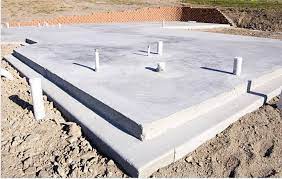When it comes to building your dream home, the foundation is the foundation. Residential concrete slabs are a popular and practical choice among the various foundation options available. In this blog, we’ll look at the advantages of using concrete slabs as your home’s foundation, the construction process, and why they provide a solid foundation for comfortable living.
- Stability and Durability:
Concrete slabs are well-known for their tensile strength and durability. They can withstand the test of time and the stresses of supporting an entire home as a foundation material. Here are some of the reasons why concrete is the best choice for a solid foundation:
- Load-Bearing Capacity: Concrete has a high load-bearing capacity and can withstand heavy loads without cracking or deterioration. This ensures that your home is structurally sound for the duration of its life.
- Resistance to Settlement: Concrete slabs are less prone to settling or sinking than other foundation types, providing a stable and level foundation for your home.
- Resistance to Environmental Factors: Because concrete is resistant to moisture, pests, and rot, it is an excellent choice for areas that experience varying weather conditions.
- Energy Conservation:
A well-insulated concrete slab foundation can help your home’s energy efficiency. Concrete slabs, when properly designed, can help regulate indoor temperatures, reducing the need for excessive heating or cooling. Here’s how they help with energy efficiency:
- Thermal Mass: Because concrete has a high thermal mass, it can absorb and store heat. The slab absorbs heat during the day and releases it at night, assisting in the maintenance of a more stable indoor temperature.
- Radiant Heating: Concrete slabs can accommodate radiant heating systems, which efficiently distribute heat throughout the floors of your home. This type of heating has the potential to be more energy-efficient than traditional forced-air systems.
- Design Versatility:
Concrete slabs provide design flexibility, allowing for a variety of architectural styles and floor plans. A concrete slab foundation can accommodate your vision for a single-story ranch home or a multi-story modern masterpiece. Furthermore, it facilitates the incorporation of features such as basements, crawl spaces, or slab-on-grade construction.
- Low Maintenance:
Concrete slab foundations require less maintenance than other types of foundations such as crawl spaces or basements. There is no need to be concerned about moisture issues, foundation vents, or potential flooding once the structure is built. Over the life of your home, this can save you time and money on maintenance and repairs.
- Pest Control:
Concrete slabs act as a deterrent to common household pests like termites and rodents. Because there are no accessible crawl spaces or basements, pests have a more difficult time infiltrating your home through the foundation.
- Timeline for Quick Construction:
A concrete slab foundation is typically built faster than other foundation types. Excavation of the site, preparation of the subgrade, and pouring of the concrete slab are all part of the process. Construction time can be reduced with proper planning, allowing you to move into your new home sooner.
- Budget-Friendly:
Concrete slab foundations are frequently less expensive than alternatives such as basements or crawl spaces. Lower labor and material costs are a result of shorter excavation and construction times. Furthermore, the design’s simplicity can result in cost savings.
- Possibility of Space Utilization:
A concrete slab foundation, depending on your design and local building codes, can provide additional space utilization options. Consider a slab-on-grade design with a sunroom, patio, or outdoor living area that is directly accessible from your home.
- Simple Floor Installation:
Concrete slabs from https://www.kingdomcomeconcrete.com/ serve as an exceptional foundation for a wide range of flooring materials, including hardwood, tile, carpet, and laminate. Thanks to their level and flat surface, these slabs offer a stable and smooth base for your selected flooring, simplifying the installation process while ensuring its reliability.
- Design for Flood Resistance:
Elevated concrete slabs can be designed in flood-prone areas to raise the home above potential flood levels. This adds another layer of protection against water damage, protecting your home and belongings.
A Concrete Slab Foundation is Built in the Following Steps:
Several key steps are involved in the construction of a residential concrete slab foundation:
- Site Preparation: Debris, vegetation, and topsoil are removed from the construction site. Excavation is carried out to reach the desired depth, after which the soil is compacted to form a stable subgrade.
- Formwork: Wooden or metal forms are used to create the foundation’s outline. This formwork defines the dimensions of the concrete slab and aids in its level and squareness.
- Reinforcement: Depending on the design specifications, steel reinforcement, such as rebar or wire mesh, may be added to reinforce and strengthen the concrete slab.
- Concrete Pouring: After the formwork and reinforcement have been installed, concrete is poured into the designated area. The surface is then leveled and smoothed to achieve a uniform appearance.
- Curing: The concrete slab is cured after it has been poured to ensure proper hydration and strength development. The concrete is typically kept moist and protected from extreme temperature fluctuations during this process.
- Inspection: Local building officials may conduct inspections to ensure that the foundation complies with building codes and standards.
- Flooring Installation: After the concrete slab has cured, you can install flooring materials based on your design preferences.
Conclusion:
A residential concrete slab foundation provides numerous benefits, ranging from strength and durability to energy efficiency and design flexibility. Its low maintenance requirements and pest-resistant properties make it an attractive option for homeowners looking for a long-lasting foundation. A concrete slab foundation can provide a reliable and comfortable base for your living space, ensuring a solid foundation for years of enjoyment and peace of mind, whether you’re building a new home or considering a foundation replacement, learn more here.



